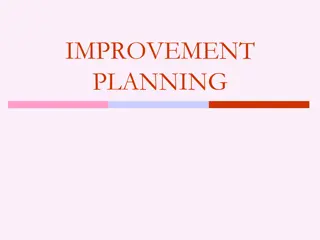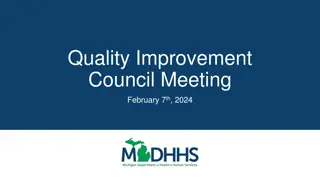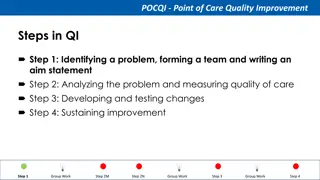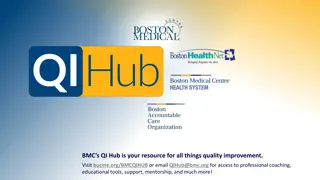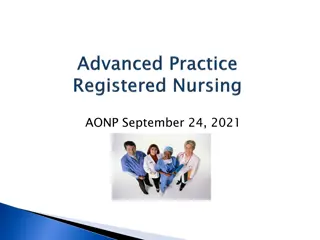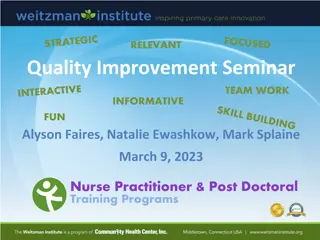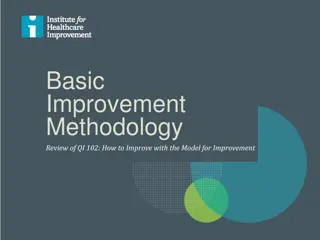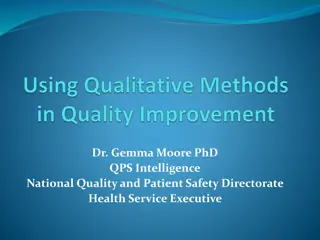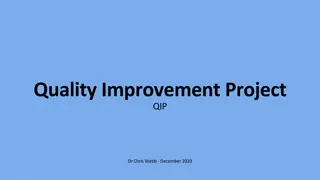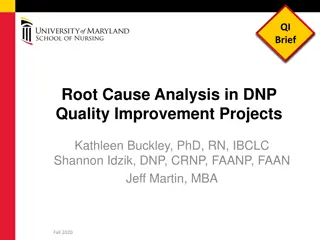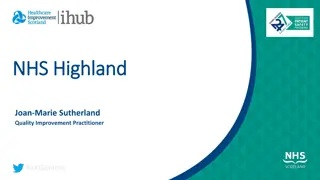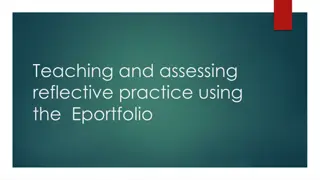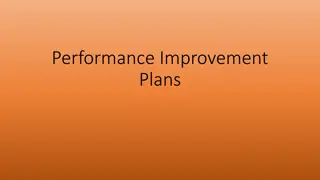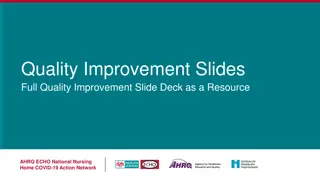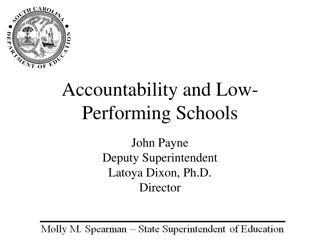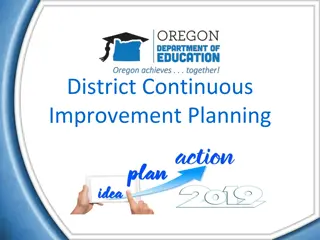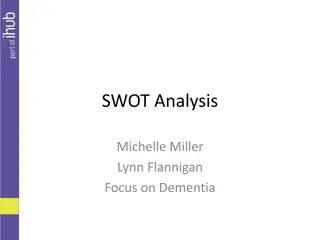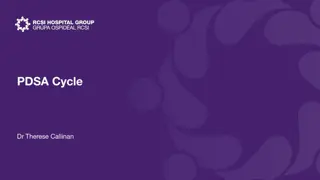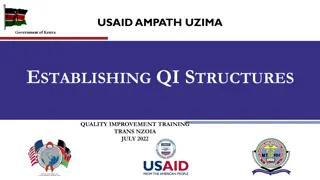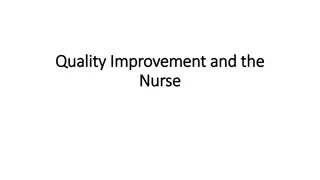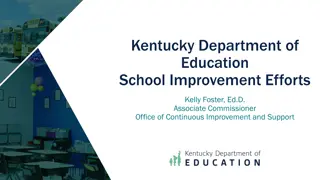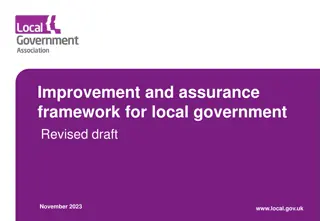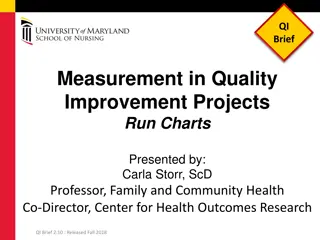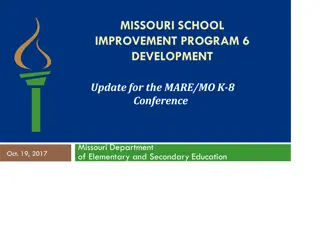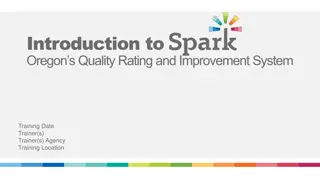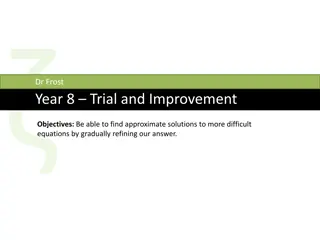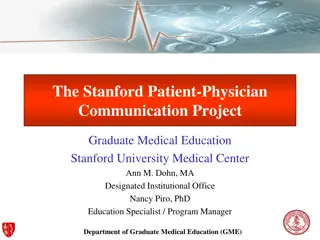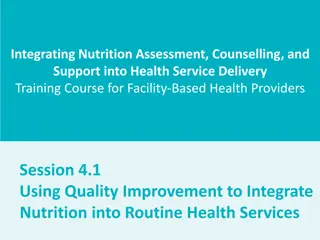Integrated Improvement Plan 2023-2024
The Integrated Improvement Plan 2023-2024 focuses on establishing stable leadership and governance structures, enhancing communication and engagement efforts, and implementing quality improvement methodologies. Key milestones include filling substantive executive leadership positions, developing gov
0 views • 13 slides
Resource Allocation Review Webinar: Enhancing School Improvement Practices
Delve into the essential aspects of Resource Allocation Reviews in the educational setting through this webinar provided by the Office of School and District Improvement. Gain insights on the requirements, tools, and significance of conducting Resource Allocation Reviews to enhance school improvemen
0 views • 25 slides
Understanding Outcome-Based Education (OBE) and Accreditation for Program Evaluators Workshop
Explore the framework of OBE and accreditation, focusing on defining program outcomes, assessing outcomes, and continuous improvement through evaluation guidelines and reports. Learn about quality improvement in education through curriculum design and attainment analysis. Discover how to measure stu
4 views • 115 slides
Comprehensive Guide to Improvement Planning Stages and Tools
Explore the key stages of improvement planning, including self-assessment, performance evaluation, documentation, measurement, and planning. Learn about different tools for prioritizing, problem understanding, analysis, idea generation, and implementation to enhance organizational effectiveness. Div
6 views • 10 slides
California Forest Improvement Program (CFIP) Overview
The California Forest Improvement Program (CFIP) aims to promote investments in forestlands to ensure timber supplies, employment, and economic benefits while enhancing the forest resource. Funding sources, program objectives, eligibility requirements, and reimbursement details are covered in the pr
1 views • 22 slides
Funding Requirements for Higher Education Improvement Projects
The content outlines the restrictions and regulations related to the release of capital funds for planning and improvement of higher education facilities from the Higher Education Improvement Fund. It highlights conditions under which funds may be released, including ownership or long-term lease agr
1 views • 6 slides
Quality Improvement Council Meeting
Highlights from the Quality Improvement Council Meeting on February 7th, 2024 include updates on Behavioral Health, Current Initiatives/Workgroup Updates, and key activities in Developmental Disabilities Practice Improvement and National Core Indicators.
0 views • 8 slides
Point of Care Quality Improvement (POCQI) Steps in Quality Improvement
POCQI involves four key steps: identifying a problem, analyzing the problem, developing and testing changes, and sustaining improvement. It emphasizes reviewing data, prioritizing problems, forming effective teams, and writing clear aim statements. Teamwork is crucial for healthcare improvement as i
0 views • 62 slides
BMC's QI Hub: Your Quality Improvement Resource
BMC's QI Hub offers professional coaching, educational tools, support, mentorship, and more for quality improvement. Learn about run charts, understanding variation, tracking data over time, and distinguishing between common cause and special cause variation. Discover how run charts help assess inte
0 views • 38 slides
Overview of APRN Regulation and Practice in Oklahoma
This content delves into the regulation and practice of Advanced Practice Registered Nurses (APRNs) in Oklahoma. It covers who regulates nursing practice, the roles and populations of APRNs, examination of laws related to CNP practice, approved certifications for APRN licensure, and updated legislat
0 views • 33 slides
Advanced Clinical Practice Framework and Pillars of Practice
The document discusses the advanced clinical practice framework and the four pillars of practice which include leadership & management, clinical practice, education, and research. It emphasizes the importance of core capabilities and area-specific competence in advanced clinical practice. The role o
2 views • 8 slides
Quality Improvement Strategies for Stakeholder Engagement
Dive into the world of quality improvement with a focus on stakeholder engagement at the upcoming seminar led by Alyson Faires, Natalie Ewashkow, and Mark Splaine. Learn about effective conflict management, stakeholder considerations, and more through interactive sessions and insightful discussions.
2 views • 28 slides
Improving Quality with the Model for Improvement
In this content, we delve into the Model for Improvement methodology, focusing on key aspects such as setting aims, choosing measures, developing and testing changes. It discusses the three questions in the Model, elements of an effective aim statement, types of measures, and utilizing change concep
1 views • 27 slides
Using Qualitative Methods in Quality Improvement Projects
Qualitative methods offer valuable insights in quality improvement projects by capturing non-numerical information like experiences, thoughts, and perspectives. They help to understand patient and staff perspectives, challenges, and successes in QI initiatives. Utilizing techniques such as interview
1 views • 21 slides
Importance of Quality Improvement Projects in Medical Training
Trainees in medical fields are urged to engage in Quality Improvement Projects (QIPs) to enhance patient care, safety, and clinical effectiveness. These projects involve identifying areas for improvement, implementing changes, and measuring the impact of interventions. QIPs are emphasized in medical
0 views • 30 slides
Root Cause Analysis in Quality Improvement Projects
Explore the significance of analyzing root causes in quality improvement projects, with a focus on tools like fishbone diagrams. Learn why and when to conduct root cause analysis, along with various strategies and tools available for this process. Enhance your understanding of identifying and addres
1 views • 17 slides
Collaborative Achievement in Quality Improvement at NHS Highland
Joan-Marie Sutherland, a Quality Improvement Practitioner at NHS Highland, shares their achievements, success factors, challenges overcome, and strategies for improving Acute Kidney Injury care. Key elements include dedicated QI support, staff engagement, project prioritization, building relationshi
0 views • 11 slides
Enhancing Reflective Practice Using Eportfolios
Reflective practice is a metacognitive process crucial for self-understanding and future action. Utilizing Eportfolios in teaching and assessing reflection helps trainees develop critical thinking skills. The session plan includes discussion on educator comments, exploring Eportfolios, and strategie
0 views • 16 slides
Utility Performance Improvement Strategies
Effective utility performance improvement involves benchmarking, selecting key performance indicators (KPIs) aligned with strategy, developing improvement plans, and implementing initiatives to achieve targets. This process entails identifying focus areas, setting improvement targets, and implementi
0 views • 37 slides
Effective Learning Event Analysis: A Key Aspect for Quality Improvement
Quality Improvement is a crucial aspect of healthcare, and conducting a Learning Event Analysis (LEA) is an essential skill that benefits professionals, patients, and practices. It involves choosing relevant cases that prompt reflection, learning, and practice change. The process should be a practic
1 views • 27 slides
ARHOME: Arkansas Health & Opportunity for Me Demonstration Project
The ARHOME project in Arkansas aims to improve health outcomes and economic independence by transitioning Medicaid recipients to private insurance while maintaining eligibility and federal funding. With measurable goals focused on health improvement and poverty reduction, ARHOME seeks to drive quali
0 views • 16 slides
Quality Improvement Strategies for Nursing Home COVID-19 Response
Using a comprehensive slide deck as a resource, this presentation delves into quality improvement questions, such as what is working and not working, root cause analysis, and identifying underrepresented groups for better outcomes. It outlines a structured three-part agenda for improvement coaching
0 views • 20 slides
School Accountability and Improvement Initiatives in South Carolina
ESSA requires states to use indicators like academic achievement, graduation rates, and school quality to measure school performance. South Carolina has identified 46% of its schools for improvement, with a focus on low-performing subgroups. Various support and improvement programs aim to address th
0 views • 8 slides
Oregon District Continuous Improvement Planning Process
Explore the key components of Oregon's district continuous improvement planning process, including objectives, executive memos, ODE commitments, and the essential elements that all Oregon districts must incorporate into their continuous improvement plans. Learn about the shifts in the overarching vi
0 views • 9 slides
Understanding Practice Drift in Nursing: Risks and Consequences
Explore the concept of practice drift in nursing, where nurses may deviate from standards leading to unsafe practice. Learn how to identify and prevent practice drift, understand scope of practice, and adhere to state regulations. Discover the importance of following the Model Nurse Practice Act and
0 views • 35 slides
Quality Improvement Strategies for Dementia Care Enhancement
Explore the importance of improvement initiatives in dementia care through SWOT analysis, experience sharing, and fundamental concepts. Discover why adaptability is key to survival and how quality improvement differs from research and performance. Learn about executing QI ideas, the Model for Improv
0 views • 23 slides
The Model for Improvement and PDSA Cycles in Quality Care
The Model for Improvement framework introduces PDSA cycles as a method for testing changes in practice to determine if they lead to improvement before full implementation. PDSAs focus on translating ideas into action and conducting small tests of change iteratively. Testing changes before implementa
0 views • 17 slides
Enhancing Quality Improvement in Health and Social Care
Explore how to support innovation and improvement at all levels within the Health and Social Care sector through the Quality Attributes Framework (QAF). Discover eLearning programs, face-to-face courses, and consultancy services aligned with the framework to drive quality improvement. Put people fir
0 views • 22 slides
Mastering Skills Through Purposeful Practice
Mastering skills, such as perfect pitch in music, requires purposeful and deliberate practice from a young age. The brain's adaptability diminishes after six years old, emphasizing the importance of early training. Effective practice involves setting specific goals, receiving feedback, and pushing b
0 views • 23 slides
Establishing Quality Improvement Structures in Healthcare Settings
Learn about the importance of Quality Improvement Teams (QITs) and Work Improvement Teams (WITs) in healthcare facilities, their formation processes, roles, and responsibilities. Discover how QITs and WITs contribute to enhancing decision-making, commitment to quality improvement, and overall health
0 views • 35 slides
Quality Improvement in Healthcare: Connecting Research, Education, and Practice
Explore the vital link between research, education, and practice in quality improvement within healthcare. From identifying needs for improvement to the history of QI initiatives, understand how stakeholders collaborate for better patient outcomes and system performance. Discover resources like QSEN
0 views • 15 slides
Kentucky Department of Education School Improvement Efforts
The Kentucky Department of Education focuses on school improvement efforts through Comprehensive Support and Improvement (CSI), Targeted Support and Improvement (TSI), and Additional Targeted Support and Improvement (ATSI) programs. Schools undergo a statutory and regulatory process as per state law
0 views • 7 slides
Improvement and Assurance Framework for Local Government - November 2023
Local authorities play a crucial role in their own performance and improvement, guided by the sector-led improvement approach. This framework emphasizes accountability, transparency, and continuous improvement, supported by tools and resources provided by the LGA. Assurance and accountability mechan
0 views • 18 slides
Understanding Run Charts in Quality Improvement Projects
Run charts are essential tools in quality improvement projects, allowing the tracking of data points over time to identify signals of improvement or degradation. They are used in the MAP-IT QI process to assess historical metrics before planning improvements. This brief provides insights on when to
0 views • 12 slides
Missouri School Improvement Program: Development Update
The Missouri School Improvement Program (MSIP) focuses on improvement drivers, policy goals, development teams, timeline, emergent themes, performance standards, and process standards to enhance the academic achievement, readiness of graduates, and overall educational experience in schools and distr
0 views • 43 slides
Home Improvement Market Trends & Forecasts 2023
The once booming home improvement market is projected to decline in 2023 due to inflation, higher prices, and job market softening. Insights from 2022 show a surge in home improvement projects among new homebuyers. The impact of the housing market on home improvement spending is significant, while r
0 views • 10 slides
Understanding Oregon's Quality Rating and Improvement System (QRIS) Training Overview
This training provides an in-depth look at Oregon's Quality Rating and Improvement System (QRIS), covering topics such as the Quality Improvement Plan, participation in Spark, program supports and incentives, portfolio submission, Spark partners, and more. Gain valuable knowledge and tools to enhanc
0 views • 45 slides
Practice Trial and Improvement Method in Equations
Enhance your skills in finding approximate solutions to equations through trial and improvement methods. Understand the concept of number lines, inequalities, and how to refine answers gradually. Practice solving equations by testing different values and determining the most accurate solutions. Expl
0 views • 10 slides
Enhancing Patient-Physician Communication in Graduate Medical Education
The Graduate Medical Education at Stanford University is focused on improving patient-physician communication through quality improvement projects led by Chief Residents. The initiative aims to address patient satisfaction by implementing the C-I-C-A-R-E method and encouraging residents to systemati
0 views • 23 slides
Integrating Nutrition Assessment and Counseling: Quality Improvement in Health Services
This training course focuses on integrating nutrition assessment, counseling, and support into routine health services using quality improvement methods. Participants will learn to explain the concept of quality improvement, develop a plan for integrating nutrition services, and understand key princ
0 views • 32 slides



